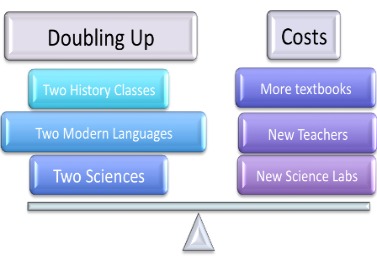 Academic issues of the school board elections are explored
Academic issues of the school board elections are explored

This Nov. 2, three seats on the FUHSD Board of Trustees will be open. Barbara Nunes, Hung Wei, and Bill Wilson are looking for reelection while Michael Goldman, Miyuki Goldman, Monet Goldman and Pradeep Jain are challenging for the seats.
[Related: FUHSD Board of Trustees: candidates preview]
The candidates clash over the challengers’ proposal to expand the district’s course and program offerings.
![]()
This project relates to content in the October 20, 2010 El Estoque Print issue.
The Issues
For the spending, unification, and field lights issue, see the Oct. 20 print article on the board elections.
Every Student Served?
The challengers, Jain and the three Goldmans, attack the current board for not sufficiently serving the entire spectrum of students.
“The students in the bottom of the quartile and maybe the top 10% somehow can’t be handled in the system,” Jain said. “Across the street is De Anza [College] and they have like twenty courses starting from basic sentence writing…while we just have [a few] classes.”
The Goldmans point out one particular shortfall of the district — the low performance of Algebra I students, especially those of Fremont High School.
“We have a large number of students that are struggling with Algebra 1, over 30%, and whether they’re economically disadvantaged or middle class, they are falling farther and farther behind,” Michael Goldman said.
The Goldmans’ plan to reallocate more money from administrative spending to address the problem. Likewise, Jain wants to establish more levels within each course to adapt to each student better. However, the incumbents point to the unique situation of FHS.
“[FHS] has a large number of limited English-speaking students who deserve to have programs that address their needs,” Nunes said. “Once they are successful, which we find they’re very successful, they do as well, if not better, than other students.”
The incumbents also highlight the programs already in place in the district, such as the Terra Nova and New Start programs, for students whose circumstances may prevent them from being able to attend high school regularly.
“Our school district offers more than 15 educational options for all of our students,” Wei said.
“[The schools] offer a rich variety of AP courses, which is increasing,” Wilson said. “We need to support also our middle students who are sometimes lost in the cracks to make sure they are engaged in our schools.”
Yet the challengers argue that the current programs and classes in place are not enough. For example, there are currently only two options for sophomores taking history: regular World History or World Studies (in CHS and FHS). Michael Goldman wants to expand to include AP World History, AP European History and even Honors World History.
“Kids need choices. They don’t have them now,” Michael said. “We can offer more choices and it won’t cost us anything.” Doubling Up Debate
Doubling Up Debate
The district’s “no doubling-up” policy, limiting the majority of students to only one class per subject area, was implemented in 2006 as a cost-cutting measure. While a few students do have two classes in subject areas, the majority of students, wanting more classes in popular subjects such as science, can only be guaranteed one class due to budget constraints.
The central issue to the debate is the cost of allowing students the privilege of taking extra classes since all candidates endorse greater choice for students. If new sections of science, for example, have to be added to accommodate the demand, it will end up costing the district much more to provide the necessary facilities.
Jain and the Goldmans again believe that the money should already be going into those extra sections instead of administrative spending.
“Money towards construction should be going towards building better lab facilities…so we can have more classes,” Monet said.
On the other hand, the incumbents do want to remove the policy at some point — the district just does not have the money currently to reorganize the schools for doubling-up.
“Right now, we’re barely making all the programs,” Wei said. “So it’s not really realistic to expect to add classes right now, but as soon as we have more money, we will add more science classes.”
Conclusion
Each challenger presents a daring plan for the district, with inventive ideas aiming to bolster the academic strength of each high school. To fund it: spend differently and divert more money towards classrooms and teachers.
The Goldman family, if elected together, may face a conflict with the Brown Act, which states that actions of public servants must be taken openly and their deliberations conducted openly. Michael Goldman has already consulted with political experts on the issue.
“We are very aware of this,” Michael said. “As for why three people from the same family are running: it’s called democracy. If we didn’t run, there would not have been opposition. Two years ago, there were three candidates running and they had no opponents.”
“We have three seats open,” Miyuki said. “This will be a good opportunity to change in a positive way…for the district to [provide] higher education.”
The incumbents are for the most part happy with the district’s progress, although they do acknowledge that there is still room for improvement.
“I’m very happy that every candidate has a heart for education,” Wei said. “Even [if] we win or lose, let’s keep up and work for the district… and really show where our heart is.”
{cc-by-nc-sa}








